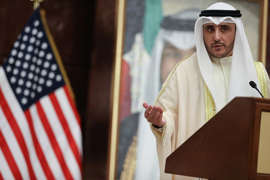The emir of Kuwait, Sheikh Nawaf al-Ahmad al-Jaber al-Sabah, dismissed one of the ministers who was a relative of him. The usual administrative decision provoked a scandal in the ruling family and throughout the emirate.
The result was the resignation of the full cabinet of ministers and the recognition by the ruling elite of Kuwait of the presence of widespread corruption in the country.
It turned out that the unlucky relative at one time signed a document authorizing the withdrawal of a substantial amount of money from the country's budget. The funds were allegedly used to finance some secret operations, and, according to him, the late Emir of Kuwait, the father of the current head of state, gave the verbal permission for this transaction.
The money was banally stolen, but the reference to the verbal approval of the emir who left the world sounded like an insult to the investigators and Sheikh al-Sabah, writes The Arab Weekly.
Now it is almost impossible to get to the bottom of the truth, just as it is impossible to establish what other decisions an enterprising member of the ruling family put into practice, referring to the approval of the late ruler.
In Kuwait – the only parliamentary monarchy in the world in which the ruling emir is elected and approved by parliament – such a large-scale scandal flares up at a critical moment for this country: the economy of Kuwait has been experiencing difficulties in recent years, aggravated by the coronavirus pandemic.
Russian-Kuwaiti relations are overshadowed by the lack of progress in the release of Russian citizen Maria Lazareva, unjustly persecuted by the Kuwaiti authorities.

